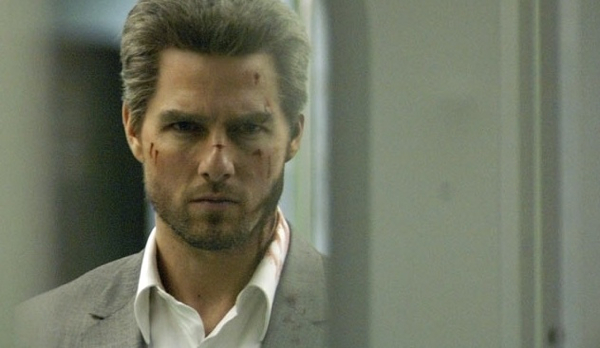Movie review by Greg Carlson
Director Michael Mann straddles a line occupied by very few commercial filmmakers, placing his own visionary stamp on scripts that might otherwise be handled with conventional banality. Like some of his best work, “Collateral” merely uses the urban crime genre – with a bit of police procedural thrown in for good measure – as a way to examine masculinity. The film is undeniably attractive : it packages essentially the world’s biggest star, Tom Cruise, with another veteran performer, Jamie Foxx, who is just now being allowed to show off his formidable talent as a dramatic actor.
Cruise plays Vincent, a steely contract killer with a metallic suit that matches his silvery hair. He enters a cab driven by Foxx’s Max, a fastidious employee whose dreams of owning his own limousine company have never materialized. Reluctantly agreeing to shuttle Vincent to five stops (it’s against company rules, but the fistful of crisp C-notes proves too tempting), Max immediately regrets his decision when a body lands on the windshield of his spotless taxi. Mortified, Max realizes that Vincent is not a typical fare, and before you can say “high concept,” Max becomes a reluctant accomplice in Vincent’s gruesome, nighttime odyssey.
Mann knows how to capitalize on Stuart Beattie’s screenplay, and “Collateral” easily shifts back and forth between frenzied, high-wire action and penetrating psychological disclosure. Mann makes movies in which men must do things with, to, and for other men in order to define their maleness, and there is something perversely delicious about the homoerotic tension developed between Max and Vincent as they come to depend upon one another. We never lose sight of Max’s desperation to escape from Vincent, but the frequent conversations about the need to improvise, take risks, and break away from the expected routine allow Mann to explore the unlikeliest of possibilities: mutual respect and possibly even friendship between the two characters.
Stylistically, “Collateral” is as tight as Mann’s other movies; stray coyotes pad across neon-lit streets while overhead shots of L.A.’s labyrinth of concrete highways sweat with a strange beauty. Because of its linear structure, “Collateral” has to be effective with each of the movements in its quintet, and several of Vincent’s actions take on surreal and operatic qualities. In one set-piece, Max and Vincent listen to jazz at a night club, and engage musician and club owner Barry Shabaka Henley in conversation. Henley’s performance, an actor’s dream in which a lengthy monologue about meeting Miles Davis in the 1960s merely serves as a metaphor about sadness and regret, is one of the jewels of “Collateral.”
Along with Henley, “Collateral” is populated with interesting actors in small but intense roles. Mark Ruffalo is underutilized as an intuitive detective, and Jada Pinkett Smith’s character gets stuck in a Hitchcockian time warp after playing in one of the movie’s most intriguing early scenes. Javier Bardem gets to deliver a juicy speech about Santa Claus and Black Peter, and Irma P. Hall makes an impression as Max’s hospitalized mother. Undoubtedly, though, the strength of the film rests with the exchanges between Max and Vincent, and both Cruise and Foxx are excellent. In “Collateral,” Mann has managed a tricky task: he has made a hard-boiled, suspenseful action movie with both a beating heart and a brain.
